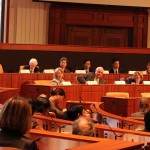 | Beedie School of Business NewsAs China’s economy slows to a medium-high growth forecast, the government has revealed plans for structural reforms around State-owned Enterprises (SOEs). Though these reforms offer opportunity for the Chinese economy, they are not without potential pitfalls. Read More... |
Archives
 | Beedie School of Business NewsA commitment to innovation and green technologies, and a shift away from the inefficient economic model that relies on cheap labour for manufacturing will play fundamental roles in the future of China’s economy. Read More... |
 | Beedie School of Business NewsThanks to popular websites such as Kickstarter, crowdfunding – the process of raising money to fund a project or business venture through many donors using an online platform – has permeated the public’s consciousness. Yet in China, the process of crowdfunding has a different look – one that relies on face-to-face contact. Read More... |
 | EQUISBeedie research explores role of Chinese government in small-to-medium sized enterprisesDec 14, 2012Can government come to the rescue of fast-growing enterprises in surging economic markets like China? In today’s high growth economies globally – China being a relative case in point – small-to-medium sized enterprises (SMEs) are confronted with a myriad of business opportunities. At the same time, they must deal with institutions and a legacy of government involvement in their domestic environments. To this end, managers there must adopt an entrepreneurial mindset and take on what more » Read More... |
 | Beedie School of Business NewsThe following article was published by The Vancouver Sun on July 11, 2012. VANCOUVER — Last month it was Silicon Valley, next week it’s New York and after that – the world? Penyo Pal, a mobile app project by a group of Canadian university students including Jessica Fan of Simon Fraser University, is one of the leading entries in a national program called The Next 36 that’s helping to develop the business skills of 36 more » Read More... |
 | Beedie School of Business NewsThe following article was published by The Globe and Mail on July 5, 2012. Unlike in North America where students typically look like they want to leave 10 minutes before the scheduled end of a class, in Beijing Majid Ghorbani’s lectures often run 10 minutes overtime, or longer. “Students in China can’t seem to get enough. They make me feel like they really want to learn,” says the recently transplanted Vancouverite, now an assistant professor more » Read More... |
 | Beedie School of Business NewsOn the eve of London’s Summer Olympic Games, a business study from Simon Fraser University shows that the persistent effectiveness of ambush marketers leaves Olympic sponsors and those of other major sporting events particularly vulnerable – costing them not only their financial investment, but ultimately their customers. Professors Leyland Pitt and Michael Parent from SFU’s Beedie School of Business examined data from the 2008 “Li Ning affair”, which saw Olympic sponsor Adidas ambushed by lesser-known Chinese sportswear company Li Ning at the Beijing Summer Olympics. Read More... |
 | Beedie School of Business NewsFew things rankle Americans more than the sense of dependence on other nations. Dependence creates power in inverse measures. The Chinese government exacerbates this unease by voicing its unhappiness with the central role of the US dollar in the world’s economy. Its vast US dollar holdings – approximately $1.5 trillion – are affected by US monetary policy. As the world’s reserve currency, the US can fund deficits by easing its monetary policies, as the Federal Reserve did in its QEI and QEII efforts to refloat the American economy. A cheaper US dollar means Chinese dollar holdings become less valuable. The Chinese government has indicated that it expects the Yuan to become a reserve currency in the not-too-distant future, and that such a move would be beneficial in that it would reduce the vulnerability of the global economy to the US. China is the second largest economy in the world and there is a sense of inevitability to its increasing economic power. China would like to expand its role in financial markets, building off its economic strengths. Read More... |